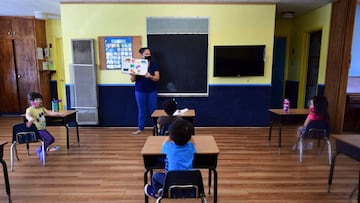Homeschooling: what are pandemic pods and how can they help parents?
Even with some online-learning options through their respective school districts, some parents are becoming the teachers themselves amid the Covid-19 pandemic.

As the number of confirmed coronavirus cases increases in the United States, many school districts will continue online classes to help curb the spread of the pandemic. There have been several proposals of safety plans and taking extra precautions for children to return for the fall semester, but that option is far from being established.
So as online learning continues through their respective districts in the United States, some parents have decided to take matters into their own hands and have opted to become the teachers themselves. Instead of waiting for instructions from authorities, some parents and entrepreneurial teachers are joining forces in a new initiative.
Home-based microschools created
Some parents are hiring tutors to increase their homeschool experience this fall and entrepreneurial teachers are serving that need. In addition to homeschooling, some parents are forming pandemic “pods” or home-based microschools that allow a handful of families to take turns teaching their children or pool resources to hire a teacher or college student.
These pods provide families with a schooling option amid the Covid-19 outbreak that feels safe and most importantly that allows kids to have fun and build their social skills as they continue to develop. Not only are they helping with the children’s learning, but also these pods are giving parents a little break from having their kids at home all day.
Entrepreneurial educators are helping to create more options for families who want their children to enhance their learning experience amid the coronavirus pandemic. In Maryland, longtime educators Steven Eno and Ned Courtemanche created Impact Connections, a microschool enabler linking educators and parents and providing learning support.
Pandemic pods are affordable
Related stories
Some parents are creating no-cost pods in which they take turns educating their children in a co-op format, and as an article in the New York Times pointed out, “the popularity of home-schoolers, before the pandemic, was less affluent than average.”
If education funding supports students rather than school bureaucracies, more families would get access to an array of education options - including these new models and ones that have yet to be invented. As lawmakers try to come up with a plan to resume the school year, parents and teachers are frustrated with how the situation is being handled amid the pandemic.

